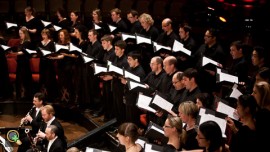REVIEW
Choristers revel in celebration of light
Sunday 22 March 2015

In a nutshell, as the Festival brochure put it, Ata Reira promised an evening of award-winning choirs, majestic voices and Te Reo Maori in song. Both separately and together, Voices New Zealand Chamber Choir and the New Zealand Youth Choir delivered all this in a choral celebration of light … and much more.
In a nutshell, as the Festival brochure put it, Ata Reira promised an evening of award-winning choirs, majestic voices and Te Reo Maori in song.
Both separately and together, Voices New Zealand Chamber Choir and the New Zealand Youth Choir delivered all this in a choral celebration of light … and much more. From the start, Paul Lim’s imaginative lighting added so much, with shifting colours and intensities complementing the singers’ groupings and re-groupings for a selection of music spanning 14 centuries.
The dramatic launch involved a medieval chant from the processing choristers gradually diffusing and clustering around a karanga sung by Natasha Wilson; yes, we were definitely in Aotearoa New Zealand in 2015.
A generous booklet offered printed lyrics and background information, as well as making important connections, such as the various settings that shared the same text.
The opening, Stars by Latvian Eriks Esenvalds, was introduced with the unworldly sound of vibrating wine glasses, an ethereal soundcloud floating above the rich sonorities of the Voices NZ singers, conducted by Karen Grylls.
Other musical responses to light included Eric Whitacre’s Lux Aurumque, in which resonant harmonies frayed into shimmering haze, and the almost pointillistic scat textures of Mason Bates’ Observer in the Magellanic Cloud.
More conservative music would come later, with Bob Chilcott’s Canticles of Light stunningly delivered but a banal piece of writing, its laboriously paced three movements separated by sententious chimes.
At the end of the concert, the singers enjoyed David Hamilton’s Ecce Beatam Lucem, a hearty extrovert piece in a genre that this New Zealand composer does so well.
A highlight for me was Murray Schafer’s 1969 Epitaph for Moonlight, a freeform colouristic adventure, responding to onomatopoeic words for moonlight (my favourites were “malooma” and “sheelesk”).
For five enchanted minutes, conductor David Squire seemed to be a painter in sound, his gestures bringing forth luscious sweeps, cries and sighs.
The other high point was specially commissioned Waerenga-a-Hika by Tuirina Wehi, effortlessly combining the jive of kapa haka with a stirring melody that Puccini would have been proud to have written.
What: Ata Reira
Where and when: Auckland Town Hall, Wednesday
Reviewer: William Dart








